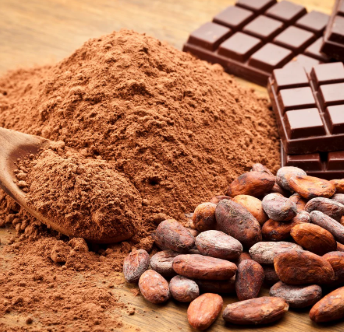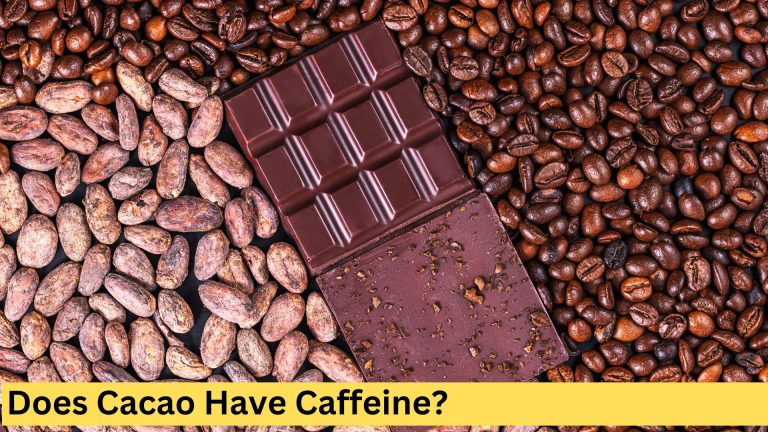Does Cacao Have Caffeine? Many chocolate lovers wonder, “Does cacao have caffeine?” After all, chocolate is known for providing a little energy boost, but is it due to caffeine or something else?
Let’s delve into the fascinating world of cacao and uncover the truth about its caffeine content and how it impacts your energy levels.
What Is Cacao?

Before we dive into its caffeine content, let’s first understand what cacao is. Cacao comes from the Theobroma cacao tree, which produces cacao beans—the main ingredient in chocolate. These beans are harvested, fermented, dried, and then processed into different chocolate products, including cocoa powder, chocolate bars, and cacao nibs.
Also Read: Does Mug Root Beer Have Caffeine?
Does Cacao Contain Caffeine?
Yes, cacao does contain caffeine, but the amount varies based on how the cacao is processed. If you’re a coffee drinker, you’ll be relieved to know that chocolate contains much less caffeine than a cup of coffee.
Here’s a quick breakdown:
- Raw cacao: Contains moderate amounts of caffeine.
- Dark chocolate: Has more caffeine than milk chocolate because it contains a higher percentage of cacao solids.
- Milk chocolate: Contains much less caffeine due to the lower cacao content.
- White chocolate: Technically, it has no caffeine, as it doesn’t contain cacao solids—just cocoa butter.
Also Read: Does Blonde Espresso Have More Caffeine?
How Much Caffeine Is in Chocolate vs. Coffee?
To put things into perspective, here’s how chocolate compares to coffee in terms of caffeine content:
- A standard 8-ounce cup of coffee: Contains around 95 mg of caffeine.
- A 1 oz piece of dark chocolate (70-85% cacao): Has about 22 mg of caffeine.
- A 1 oz piece of milk chocolate: Contains only 5-10 mg of caffeine.
As you can see, dark chocolate has some caffeine but nowhere near the amount found in a typical cup of coffee. So, while chocolate gives you a little perk, it won’t replace your morning coffee.
Also Read :Does A&W Root Beer Have Caffeine?
Theobromine: Chocolate’s Secret Energy Booster
While caffeine gets most of the attention, there’s another compound in chocolate that plays a big role in its stimulating effects—theobromine. This natural stimulant is found in cacao and has a gentler, longer-lasting impact compared to caffeine.
How does theobromine affect your body?
- Mild stimulant: It provides a subtle boost in energy without the jitters often associated with caffeine.
- Longer-lasting effects: While caffeine gives a quick jolt, theobromine offers a slower, steadier release of energy.
- Good for heart health: Theobromine has been linked to improved circulation and lower blood pressure.
So, if you’ve ever noticed that chocolate makes you feel good but without the crash of coffee, theobromine is probably the reason.
Also Read: Does Coffee Liqueur Have Caffeine?
Does Chocolate Keep You Awake?
If you love a late-night chocolate treat, you might wonder if it will interfere with your sleep. While the caffeine content in chocolate is relatively low, it can still affect sensitive individuals.
Here’s what you need to know:
- Dark chocolate: If eaten in large amounts, it might disrupt sleep due to its caffeine and theobromine content.
- Milk chocolate: Unlikely to cause sleep issues unless consumed in excessive amounts.
- White chocolate: Safe to eat at night as it contains no caffeine.
If you are highly sensitive to caffeine, it may be best to limit dark chocolate intake in the evening.
Also Read: Does Ginger Ale Have Caffeine?
Which Chocolate Has the Most Caffeine?
If you’re looking for an energy boost, darker chocolates are your best bet. The general rule is:
- The darker the chocolate, the more caffeine it contains.
For example:
- 85% dark chocolate: Has the most caffeine.
- 70% dark chocolate: Still a good source, but slightly less than 85%.
- Milk chocolate: Contains only small amounts of caffeine.
- White chocolate: Completely caffeine-free.
Should You Worry About the Caffeine in Chocolate?
For most people, the caffeine in chocolate isn’t something to be concerned about. Even if you eat dark chocolate, the caffeine content is relatively low compared to a cup of coffee or an energy drink.
However, you might want to monitor your intake if:
- You are highly sensitive to caffeine.
- You have trouble sleeping.
- You are consuming large amounts of dark chocolate daily.
Also Read: Does Squirt Have Caffeine?
Video About Does Cacao Have Caffeine?
The Bottom Line: Chocolate and Caffeine
Yes, cacao contains caffeine, but in much smaller amounts compared to coffee. If you’re looking for a mild energy boost, dark chocolate can be a great choice. Plus, thanks to theobromine, you’ll get a gentle pick-me-up without the jitters.
So, whether you’re indulging in a rich dark chocolate bar or sipping on a hot cocoa, you can enjoy your treat with the knowledge that its caffeine content is quite minimal.
Now, tell us—do you feel an energy boost after eating chocolate? Let us know in the comments below!

